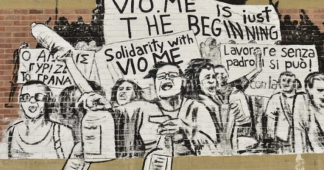The auto parts firm GKN is laying off thousands of workers across Europe, sparking a series of strikes and protests. And rather than helping workers, the European Union is helping the company offshore their jobs.
By Aurélie Dianara
Translation by David Broder
Sep. 30, 2021
Faced with what looked like an absurd decision, the workers decided to fight back: They occupied the factory, organized huge protests and marches, set up local and Italy-wide solidarity networks, and convened an assembly of supportive lawyers to help write a bill against redundancies and offshoring. And they won support and media visibility. There was an outpouring of statements by politicians both left and right, and Campi Bisenzio’s mayor even issued an order prohibiting trucks in the area, in order to prevent the British multinational that owns the plant from coming to collect its machinery.
There was also a government response, announcing an anti-offshoring law supposedly inspired by France’s deeply ineffective “loi Florange.” And the workers have won their first battle: On September 20, the Florence Labor Court revoked the declaration of collective redundancies on the grounds of “anti-union conduct.” But it’s clear the multinational won’t give up, and the battle won’t end here.
From Campi Bisenzio, Birmingham, and Offenbach . . . to Oleśnica
In this sense, the fate of the Italian, British, and German GKN workers is hardly new. Rather, it is the shared fate of hundreds of thousands of workers in the Europe that has been built over the last seventy years. That means a European Union (EU) that enshrines the freedom of movement of goods, capital, and companies, and that is based on fiscal, social, and wage competition between member states. In this EU, the few instruments that are supposed to protect workers’ interests are too weak and ineffective to be of any help to the people standing at the gates of GKN. Yet things could have been different.
Economic Democracy
In the 1970s, this theme inspired many reform proposals. In Italy, the appearance of works councils after 1968 and the 1970 Workers’ Statute strengthened the role of workers and their union representatives in companies. In Germany, the 1976 codetermination law (Mitbestimmung) extended the participation of workers’ representatives on supervisory boards (but not management boards) to all companies with more than 2,000 employees. In the UK, the 1977 Bullock Report — commissioned two years earlier by Labour prime minister Harold Wilson — went much further, formulating a (never-implemented) proposal known as “2x + y,” which provided for the same number of directors chosen by workers and employers, supplemented by state-appointed directors. In Sweden, the Meidner Plan proposed in 1975 by the main trade union confederation, the Landsorganisationen (LO), aimed at the gradual socialization of company ownership.
This democratization agenda also arose at a European level, both through the trade unions — unified on a continental scale in 1973 with the creation of the European Trade Union Confederation (ETUC) — and through European social democracy, which was then enjoying a strong electoral rise. The European Commission drew up a series of proposals — later systematically shelved by the European Council — aimed at guaranteeing workers’ representation on company boards or creating transnational works councils.
Attempts to strengthen workers’ control over companies were flanked by international trade-union efforts to establish democratic control over multinationals. Faced with the rise of companies resorting to offshoring or tax avoidance techniques, international trade unionism developed various strategies to stem the resulting loss of organizational and bargaining power. First, they tried to develop transnational trade union structures at the company level, the so-called World Works Councils. Secondly, they became active in bodies like the United Nations (UN) and its International Labor Organization (ILO) to obtain a legal framework to regulate multinationals’ activities. This effort, which found an important ally in the movement of Third World countries, met with strong resistance from big business and the governments representing it (led by the United States), and ultimately led only to vague and nonbinding codes of conduct for multinationals.
The third strategy developed within the European Community (EC) — the only international organization with supranational legislative powers. Here, attempts to democratize companies and control multinationals culminated in the proposal for a European directive on information and consultation of workers in transnational corporations. It was presented in 1980 by the commissioner for employment and social affairs Henk Vredeling — a Dutch Labor Party figure and early supporter of a ”social Europe” — who managed to get his proposal adopted by the European Commission, even in the face of strong hostility within this institution.
The commission’s proposal was by no means revolutionary — it talked about information and consultation, not codetermination and still less self-management. But it was seen as a serious threat by the multinationals, because it favored the possibility of workers organizing at a transnational level. The text stipulated that multinational companies’ decisions on all matters “likely to affect substantially the interests of workers” (including investments, closures or transfers, major organizational changes, mergers, and so on) would be subject to information and consultation with workers’ representatives in European subsidiaries. Further, the companies in question would have been subject to disclosure obligations (concerning their economic situation, production, investments, restructuring projects, introduction of new working methods and technologies, and so on).
The draft directive also sought to make multinationals’ head offices accountable to the workers in their subsidiaries. A so-called “bypass clause” allowed workers’ representatives to start direct consultation with the head office if its local subsidiary did not provide satisfactory information, even if the head office was located outside the European Community. If this was the case, the parent company would have had to designate an “agent” within the EC to inform and consult employees; otherwise, this responsibility would have fallen to the company’s largest subsidiary within the EC. The directive would have applied to all multinational companies with more than ninety-nine employees (or more than ninety-nine in one of their European subsidiaries).
In short, by combating business secrecy, bypassing local management, and being applicable to companies outside the EC, the directive aimed to strike at multinationals’ immunity from collective bargaining. Unlike other international agreements, the “Vredeling directive” would also have been legally binding.
The Failure of the European Left
As with other battles, for instance that over working time, the European left’s defeat on the Vredeling directive both contributed to and was symptomatic of a clear change in the balance of forces in Europe. Where the social democratic hegemony of the long 1960s had opened the way for the construction of a Europe closer to the interests of workers, since the early 1980s a conservative turn has been evident in both the European Community and its member states.
Fighting in a Neoliberal Europe
The fate of the Vredeling directive was an example of this regression: After the project’s defeat, the principle of informing and consulting European workers remained dormant for many years. In 1994, thanks to the extension of qualified majority voting in the council, the EU finally adopted a directive on the establishment of European Works’ Councils (EWCs), which required companies with more than 999 employees, including at least 150 in two different European countries, to negotiate and install a transnational body of workers’ and employers’ representatives, with legal rights to information and consultation.
But the 1994 text (revised in 2009) is much less ambitious than the Vredeling directive. Indeed, EWCs are not compulsory, but rather must be negotiated only after an initiative of at least 100 employees; the directive provides only general requirements instead of a common framework for the councils’ competencies, procedures, role, and composition; it does not extend to locations outside the EU or the European Economic Area; and, most importantly, all EWCs created before September 1996 (39 percent of the more than 1,000 EWCs existing today) are excluded from the directive’s binding legal framework.
Not Our Europe
Yet the GKN workers in Campi, Birmingham, and Offenbach continue to fight in a fragmented way. There are no real EU-wide mobilizations for a European minimum wage, for a redistribution of working time at the European level, and so on. So long as we cannot start organizing a popular counterpower at the international level — one that succeeds where social democracy has failed — we will not be able to really oppose the interests of capital and overturn the European and world order inherited from the 1970s. To do this, we will have to learn the lessons of history
Published atwww.jacobinmag.com
We remind our readers that publication of articles on our site does not mean that we agree with what is written. Our policy is to publish anything which we consider of interest, so as to assist our readers in forming their opinions. Sometimes we even publish articles with which we totally disagree, since we believe it is important for our readers to be informed on as wide a spectrum of views as possible.











